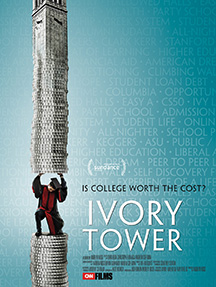By Iris Doubleday
Andrew Rossi, director of Page One: Inside the New York Times (2011), once again turns to a topic of institutional instability in his new documentary, Ivory Tower. Premiering in the U.S. Documentary Competition at the 2014 Sundance Film Festival, the film questions the value of higher education in a society where students are growing increasingly uncertain about the worth of a college education. Faced with the rising costs of tuition and loans, many students have the subject of college affordability weighing on their minds as college graduates struggle to find employment while paying off their debts. Rossi tackles the question of whether higher education is worth the cost through a close look at college campuses, creating a film that challenges our assumptions about the value of higher education.
Himself a graduate of Yale University and Harvard Law School, Rossi claims in an interview with Realscreen that his own perspective on higher education was changed during the process of filming as his findings led him to question whether his own positive experience of college is now an outdated dream in the face of the current economic trends. Current debates in the Chronicle of Higher Education express skepticism of the White House’s Bipartisan Student Loan Certainty Act, with its ten-year plan to make student loans affordable, and alternative forms of cost-efficient learning are gaining interest. MOOCs, or massively open online courses, offer a cheaper substitute to traditional learning by opening up the classroom to millions of students through the internet, and though Rossi tells Forbes that this alternative system will likely not replace the in-person instruction of traditional higher education, he recognizes its relevance to the modern era.
Ivory Tower takes a firsthand look at the states of current college campuses, documenting the experiences of students at schools as diverse as Harvard University, Bunker Hill Community College, Spelman College, and Deep Springs, with its self-governing learning environment. Rossi also goes behind the scenes of the student-run protest at Cooper Union, a New York college known for charging no tuition. The school has finally succumbed to economic hardship and has made a recent decision to begin charging tuition, a change that was met with outrage by the students.
While at first glance this film appears to show college in a negative light, suggesting that the institution of higher education has become financially corrupt, Rossi explains in an article for The Daily Beast that his main goal is to spark discussion and explore the ways in which the system could be reformed. He writes that this reform “will involve a recalibration of national priorities and a paradigm shift in the financial structure of higher education, hopefully away from the corporatized, expansionist model, with a pivot to a streamlined approach to the core mission of most non-profit colleges: educating students.” Rather than working to expose the dark inner workings of a corrupt system, Ivory Tower recognizes the benefits of a traditional college education while putting forward the idea that something in the system needs to change. Rossi’s goal is to create a film which will cause people to question their assumptions and begin a serious discussion about the future of higher education.
Iris Doubleday is a senior at Wheaton College majoring in English. Wheaton College is home to the Kappa of Massachusetts Chapter of Phi Beta Kappa.




